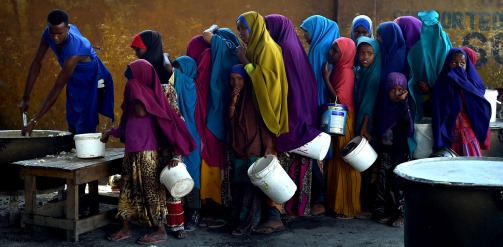The use of ‘mass starvation’ should be considered a war crime as many who are at the coalface of humanitarian crises have long argued. In their new report, the Humanitarian Learning Centre (HLC) calls for the global community to heed the lessons of the past and hold those who use famine as a weapon of war to account for their actions, by revising international law to reflect such atrocities.

As the world responds to four potential famines in Nigeria, South Sudan, Yemen and Somalia, the lessons of the past seem to be long forgotten. Unfortunately, with every new wave of food crises, many of the past lessons that should have been learned need to be “relearned”. While some of these experiences will be familiar to today’s generation of humanitarian workers and policymakers, they may not be to others.
Drawing on lessons from famine crises and response in Ethiopia and Sudan, in 1980s, up to the 2011 Somalian famine, the report explores many factors contributing to major food scarcities and the humanitarian response to them. Famine is complex, and often “man-made”, so the ‘drought causes famine’ narrative is not an adequate explanation for repeated famines, according to HLC.
In this report, HLC highlights that while drought or floods can cause crop failure, there are many other triggers such as lack of access to food, market failure and political reasons such as conflict and insecurity. The authors explain that ‘famine follows a sequence of failures in the food system: first production, then markets and employment opportunities, and finally humanitarian relief such as food aid. In famines triggered by conflict, food production, employment, trade and food aid can all be deliberately targeted or compromised.
Famines can be prevented by intervening at any point in the food system: by boosting food production, strengthening rural food markets, providing employment opportunities (including labour-intensive public works), introducing ‘shock-responsive’ social protection, or providing timely famine relief.In highlighting a set of lessons, the report focuses on the role of media, alongside other aspects of famines, including creating safety nets to ensure all citizens are protected, timeliness of response, and preventing migration to camps through food provision.
The media has a vital role to play in representing the true and complex nature of famine, explains the HLC Lessons Learned report. The authors note that traditional media has often misrepresented famine, favouring a simplistic narrative at the expense of historical, political, social and economic accuracy.
Social media and citizen journalists also have an important role to play in disrupting the dominant ‘famine’ narrative and should seek to work with aid agencies to understand the complex and often political causes of famine.
As the report demonstrates, understanding and acting on the causes of famine is integral in efforts in preventing famine. HLC calls for immediate but considered action by political, humanitarian and media actors to play their part in learning the lessons of the past and put in place vital measures to prevent these atrocities against humanity now, and in the future.
—
The Humanitarian Learning Centre is a joint initiative of the Institute of Development Studies, the International Rescue Committee and Crown Agents. Funded by the Humanitarian Leadership Academy, the Humanitarian Learning Centre is a transformative centre for operational learning that enables more effective humanitarian response.
Photo caption and credit: A severe drought is threatening famine in Somalia, where the UN estimates 5.5 million people at risk. Young girls line up at a feeding centre in Mogadishu. UN Photo/Tobin Jones/Flickr – CC BY-NC-ND-2.0